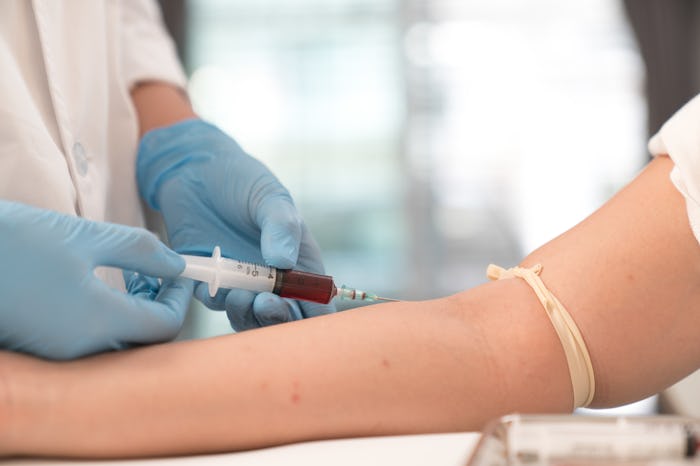Life

Where Can You Get A Blood Pregnancy Test? You Have Options
Full disclosure: I've never been pregnant. One time I took a pregnancy test when my period was a day late, only to have it show up an hour later. But as a woman trying to conceive, I've often wondered what I would do if I just "knew" I was pregnant. And I've spent many nights wondering how on earth you can trust a take-home pregnancy test. So if I found out I was pregnant, you can bet I'd be asking where can you get a blood pregnancy test so I could get some definitive confirmation, and as soon as humanly possible.
Turns out, according to parents, you can get a blood pregnancy test at your doctor's office and at select labs. Most women's health clinics, like Planned Parenthood, for example, typically only offer urine pregnancy tests except in special circumstances. In other words, just because a health clinic or local Planned Parenthood can confirm a pregnancy, doesn't mean they'll do so via a blood test. It's best to research your options and what's provided to you at each clinic and/or doctor's office, prior to making an appointment.
So, what's the difference between a urine pregnancy test and a blood pregnancy test? In a word, hCG. According to the American Pregnancy Association (APA) the human growth hormone, or hCG, is the pregnancy hormone. The APA goes on to explain, reportingL "This hormone is produced by the placenta shortly after the embryo attaches to the uterine lining and builds up rapidly in your body in the first few days of pregnancy."
Parents explains that a blood pregnancy test is much more sensitive than a urine pregnancy test, reporting the following:
"Although a home pregnancy test can usually pick up a concentration of about 50 units of hCG (the pregnancy hormone human chorionic gonadotropin), a pregnancy blood test can detect as little as 5 units of hCG."
I know I joked about wanting a blood test to confirm, but it's not usually necessary to go that route. Parents even reassures us trying to conceive women that, "early pregnancy tests aren't usually necessary, but they can make a difference for women at higher risk for miscarriage or ectopic pregnancy." If you are at risk for either of those things, you'll want to know you're pregnant at the earliest possible time so that you can head to your doctor for the most suitable treatment for whatever condition you have.
What are you in for with a pregnancy blood test? Well, actually two blood tests about 48 hours apart, according to Parents. "Early in pregnancy, your hCG levels should double approximately every 48 hours. By seeing the change in hCG levels, the doctor can evaluate for a miscarriage or ectopic pregnancy, or confirm that your pregnancy is progressing healthily."
A urine pregnancy test can typically detect pregnancy about two weeks after conception, according to the APA, whereas a blood pregnancy test can detect pregnancy seven to 12 days after conception. In other words, you could have almost a week's head start in knowing that you're pregnant if you go the blood test route. It's important to know that a blood pregnancy test is going to be more expensive than a urine test, and will take longer to come back than the two minutes it takes for a urine test to sit in your bathroom and show pink lines.
If you take a urine pregnancy test and it comes back positive, you'll then go see your doctor for an eight week check up — meaning eight weeks after the start of your last period. That's when your doctor should be able to locate the pregnancy with an ultrasound. If your doctor can't locate the pregnancy by ultrasound, the APA says he or she will likely order a blood pregnancy test to confirm whether or not you are pregnant.
As with most things in life, you've got to follow the instructions on the urine pregnancy test package. If you let the pregnancy test sit too long after peeing on it, the test will be invalid. Tests usually come with two in a package, and you should take both to confirm a positive result. And if your tests split their votes between pregnant and not pregnant, call your doctor and schedule that blood test to break the tie!
Watch Romper's new video series, Romper's Doula Diaries:
Check out the entire Romper's Doula Diaries series and other videos on Facebook and the Bustle app across Apple TV, Roku, and Amazon Fire TV.